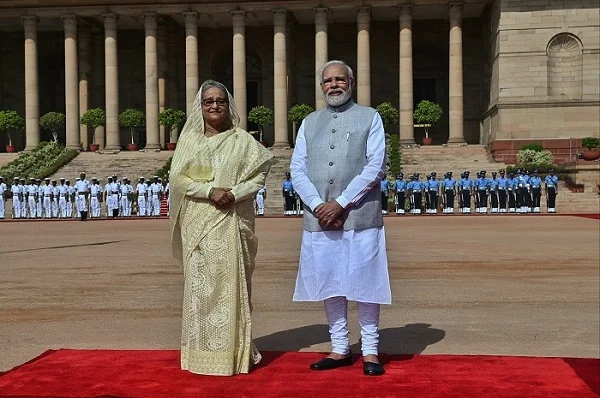India and Bangladesh on Tuesday took giant steps to rebuild broken links between the two countries to foster prosperity in the region under a progressive, inclusive and democratic template.
In order to achieve their shared vision of rapid development, rejection of radicalism, and linking the two economies with the ASEAN, Prime Minister Narendra Modi and his Bangladeshi counterpart Sheikh Hasina took some concrete forward-looking steps.
In the presence of the two leaders, the two countries signed seven pacts that would foster economic integration and positive interdependence. The two leaders were acutely conscious that their endeavours had historic significance—of undoing the structural damage caused by British colonisers of who broke the natural unity of Bengal with the creation of East Pakistan.
New Delhi |
India 🇮🇳 and Bangladesh 🇧🇩 today signed several Memorandum of Understanding & agreements at Hyderabad House where Bangladesh’s PM Sheikh Hasina stated:
“India is moving forward towards attaining resolution made for #AtmaNirbharBharat or self-reliant Bharat” pic.twitter.com/felb0bOEer
— INDIA NARRATIVE (@india_narrative) September 6, 2022
In re-establishing integration, the two leaders focused on the power sector.
PM Modi and Hasina remotely unveiled Unit-1 of the 1320 MW (660×2) Maitree super thermal power plant at Rampal in Bangladesh which is being set up as a joint venture between the two countries at an estimated cost of about $2 billion with $1.6 billion as Indian Development Assistance under Concessional Financing Scheme.
Earlier, industrialist Gautam Adani after meeting Hasina on Monday, underlined the need to complete the transmission line being constructed as part of the 1,600 MW Godda power project which will then resume exports to Bangladesh by this December. Earlier, it was expected to commence by 2021 but the project work was hit due to Covid related restrictions which were in place since 2020.
“We are committed to commissioning our 1600 MW Godda Power Project and dedicated transmission line to Bangladesh by Bijoy Dibosh, 16 Dec 2022,” Adani said in a tweet.
Keen to tap Bangladeshi territory for transit to the northeast or providing the region with ports including Mongla and Chittagong, the two leaders discussed opening the Khulna-Darshan line and the Prabatpur Kaunia track.
They also jointly inaugurated the 5.13 km Rupsha rail bridge, which is a key part of the 64.7 km Khulna-Mongla Port broad gauge rail project.
The opening of new railway lines is also vital due on geo-strategic grounds as transit through Bangladesh will lower India’s dependence on the narrow Siliguri corridor, which links the rest of the country with the northeast.
Sharing of river waters is a major concern, as it impacts livelihoods in both nations—a major element that goes into the electoral calculus in the two countries. In the presence of the two leaders, an agreement was signed on sharing waters of the Kushiyara River. The deal is expected to benefit the southern part of Assam and the Sylhet region in Bangladesh.
Today’s agreements and dialogue has an important sub-text. Three underlying concerns stand out.
First, from an Indian perspective, New Delhi wants Sheikh Hasina to win the next elections in Bangladesh. Consequently, the Indian leadership will go out of the way to indirectly support the Bangladeshi Prime Minister so that people of Bangladesh ensure that she emerges triumphant.
Second, India fully recognises that Sheikh Hasina is a bulwark against homegrown and foreign backed radical organisations such as Hefazat-e-Islam (HeI). These outfits want to replace Bangladesh’s secular nationalism with an Islamic one. As a neighbouring country with shared borders, India naturally rejects such an outcome.
Third, India does not want China’s overwhelming influence in the nation at a time when Beijing is demonstrating visible assertiveness against India in Ladakh and the Indian Ocean region. Sheikh Hasina has demonstrated a capacity to balance India and China in a manner that promotes Dhaka’s national interests. Closer integration of India and Bangladeshi economies, fostered by Prime Ministers Hasina and Modi backed by greater people- to- people interaction would greatly benefit New Delhi and Dhaka’s cause.
Also Read: India, Bangladesh sign 7 pacts to boost bilateral ties
Also Read: Is India positioning itself as Bangladesh’s major energy supplier?




















